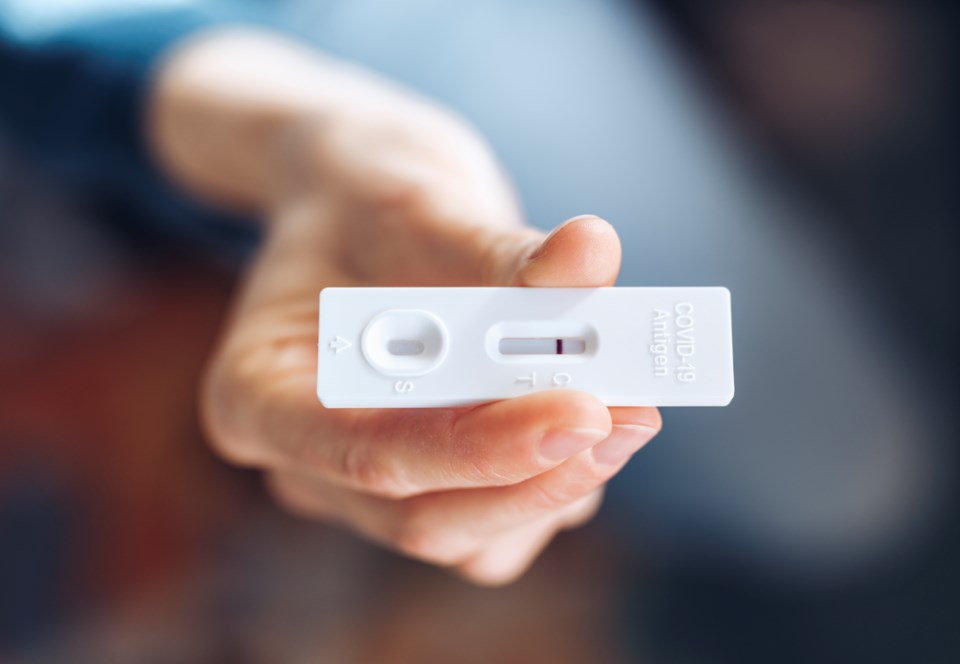As the demand for COVID-19 tests in Whistler skyrockets alongside the surging number of Omicron cases, procedures around where and how to get those tests are shifting, too.
Asked if inquiries for COVID-19 testing in the resort are on the rise after the Howe Sound Local Health Area—which includes Whistler, Pemberton, Squamish and and parts of the southern Stl’atl’mx Nation—logged a total of 125 new cases over the week spanning Dec. 12 to 18, Dr. Karin Kausky said "that's the understatement of the century."
Both rapid tests and PCR tests are now available in Whistler, but only for people who are symptomatic and who fit a specific set of criteria:
Take-home rapid tests tests are available for people in Whistler aged between five and 65 years old who are experiencing symptoms of COVID-19— including congestion, cough, fever, or sore throat—and who have had at least one dose of a COVID-19 vaccination.
The more-dependable PCR tests are being reserved for those aged 65 years and older, health care workers, those who have not been vaccinated and people with severe symptoms.
Locals and visitors must be experiencing symptoms of COVID-19 in order to access testing through public health. "The test the rapid self test is not very accurate for people that are asymptomatic," said Kausky, adding that private testing options are available for people without symptoms, such as those offered to travellers.
Anyone in Whistler experiencing symptoms of COVID-19 is encouraged to visit the Whistler Medical Clinic's website, then call its COVID-19 testing line at 604-966-1428, where a COVID screener will then direct you about which steps to take next. Kausky pleaded with locals to refrain from calling or texting the COVID-19 line multiple times. She also asks anyone seeking testing to not call the Whistler Medical Clinic, as that line needs to stay open for patients.
"There is a delay in getting back to people unfortunately, because the demand has increased so much," said Kausky, "And then when we call back we either direct them to go pick up a rapid test or to go for PCR testing."
Rapid tests must be taken at home (you can find instructions on how to do so here). Kausky cautioned that the rapid tests are not as accurate as PCR tests.
As Kausky explained, a person that's been infected with COVID-19 may produce a negative test result because the infection has not been active long enough for the virus to produce sufficient antigen to be detected by the rapid test.
Rapid antigen screening only provides a point-in-time result, which means that a negative result does not guarantee an individual is not contagious or will not become contagious a day or two after testing.
That said, a positive result should be taken as a "red light," to self-isolate, said Kausky.
"If you are symptomatic, and you have a home rapid test that's positive, there's no need to do a confirmatory PCR," she explained. "Just behave as if you have COVID."
But a negative rapid test result "is not a green light," Kausky continued. "It just means that at that moment in time, you don't have enough of a viral load for a rapid test to be positive. So it doesn't necessarily mean that you don't have COVID. If you are symptomatic, you should be self isolating."
Those who test positive should follow directions to report their result to help public health track the amount of cases in a community, Kausky added.
This local guidance lines up with comments made by B.C. Provincial Health Officer Dr. Bonnie Henry, who told reporters in a press briefing on Christmas Eve morning that procedures at testing stations have changed to reflect the evolving COVID-19 situation in the province.
"There is triage happening at the testing stations, particularly in [the] Vancouver [Coastal] and the Fraser health regions, where we've had long lineups and here on the island," she said.
Public health is using rapid antigen tests to supplement PCR testing based on risk, explained Henry. People who are younger and don't have underlying risk factors, particularly if they are fully vaccinated, will most likely receive a rapid test. Earlier this week, Henry told reporters that the recently identified strain poses a threat to public safety—but not everyone should visit a testing facility.
"Right now, there are a number of respiratory viruses circulating. And COVID is one of them," she said. "If you're vaccinated [and] you have mild symptoms, self-isolation and self-monitoring and caring for yourself... are important things that you can do," she said during a Tuesday, Dec. 21 press briefing.
"You don't necessarily need to get a test."
Anyone who tests negative but is still experiencing any symptoms of the virus should continue self-isolating until those symptoms go away, even if another rapid test proves negative as well. That means no working, no visiting others or inviting others to visit your home, and no heading up the mountain. If your housemate tests positive and you're fully vaccinated, Kausky said you don't necessarily need to self-isolate as long as you're not displaying any symptoms, though she recommends wearing masks at home and using separate bathrooms, if possible.
Again, anyone who receives a positive test result must self-isolate immediately. Kausky urged everyone to continue monitoring their symptoms and seek urgent medical care if needed. If you develop symptoms such as struggling to breathe, chest pain, being unable to drink, feeling very sick or confused, or any other symptoms that concern you, seek urgent medical care. You should continue to seek care for other medical conditions as needed, even if they are not related to COVID-19. Dial 911 for emergencies and 811 for advice on non-urgent matters.
Whistler Community Services Society is also available to help community members who require help with self-isolation, food and financial support as well as mental health services. Connect with an Outreach Worker at www.mywccss.org or by calling 604-932-0113.
- With files from Elana Shepert/Vancouver Is Awesome




